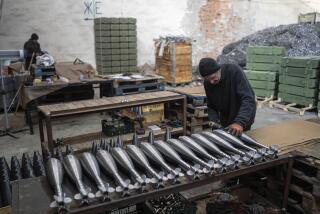Brazilian Arms Industry Sees Upswing
- Share via
SAO PAULO, Brazil — Times have been hard for the Brazilian arms industry, the largest in the Third World, but industry sources say the Persian Gulf crisis may whet the international appetite for weapons once again.
“The Iraqi offensive helped illustrate just how vulnerable the Saudis are to a similar invasion, and this should help our sales in the medium and long term,” said a source at the Engesa tank factory in Sao Paulo.
Earlier this year, Engesa and Avibras, Brazil’s two largest arms manufacturers, requested protection from creditors for debts of about $200 million.
Both traced their financial problems to money owed by Iraq, their biggest customer for years during its war with Iran. Arms sales are secret, but a much-reported figure put Iraq’s purchases at $3 billion.
The demand for weapons in the 8-year war, when Brazil’s arms industry sold to both sides, helped make it the Third World leader.
Knowledgeable sources said Iraq, which occupied Kuwait on Aug. 2, still owes Engesa $80 million to $90 million for hundreds of Urutu armored personnel carriers, Cascavel reconnaissance and anti-aircraft vehicles and Jararaca troop carriers.
A source at Avibras, who also spoke anonymously, said Iraq owed $45 million for several Astros II computer- and radar-controlled multiple rocket launchers delivered more than three years ago. He said the country also canceled orders for $100 million worth of Astros II launchers after they were produced.
Other customers in the Middle East, Latin America and Africa, the most important markets, reduced or suspended arms purchases in the late 1980s, making matters worse for Brazilian arms makers.
Because exports provide 90% of its revenue, the arms industry went from high profitability to insolvency in a few years.
Industry experts predict that weapons sales will pick up when the Persian Gulf crisis ends, as Middle Eastern countries seek to bolster their military strength.
Engesa is negotiating to sell Saudi Arabia the 42-ton Osorio battle tank, hoping to obtain a $2.2-billion order for 320 of them.
But Rene Dreifuss, a political scientist and military analyst at the Fluminense Federal University in Rio de Janeiro, said the weapons industry should not expect a bonanza.
“The Iraqi invasion of Kuwait has completely changed the weapon requirements of the region’s countries,” he said in a telephone interview. “From now on, they will want highly sophisticated armaments Brazil does not and cannot produce.”
Manufacturers attribute the success of Brazilian weapons in Third World markets to their simplicity, durability and low price.
More to Read
Sign up for Essential California
The most important California stories and recommendations in your inbox every morning.
You may occasionally receive promotional content from the Los Angeles Times.










